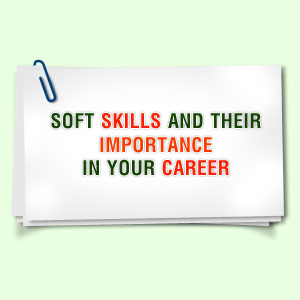“Hard skills are the foundation of a successful career. But soft skills are the cement”
Five years ago it was normal to have a line at the top of a CV just stating a professional objective. What we are seeing now is a marked shift. Most companies are less interested, in the early stages of a hiring process at least, in what a candidate wants personally. At this point hiring managers are more focused on the needs of the organisation. What does this candidate do well and can he/she do that for us? Usually followed by “how quickly?” To successfully convey that message a succinct synthesis of your career path is required, joining the dots between hard and soft skills distilling it into a coherent story with a snap shot of any achievements.
I read hundreds of CVs and professional profiles a week. It is my job to identify potential talent behind quite often poorly written presentation. Even though I have many years’ experience I am sure I miss excellent candidates. Others who are less experienced and don’t know what to look for can do this consistently. It’s not that there are typos (those resumes are frequently cut) but these profiles simply don’t tell a compelling story, giving their background and career coherence.
Usually, they have no professional summary linking hard and soft skills.
Hard skills
Their resumes will come to my attention (or other executive search specialists) probably because of the high incidence of hard skills in the text which will carry a heavy weighting in terms of keywords. This could include: education, job titles, professional training and so on. That CV would make the number which are read by a human eye. But unless that resume or professional profile tells an engaging account, the chances of the phone being picked up are slim.
If you do get lucky and speak personally to someone in the hiring process, but are not able to articulate those success stories verbally, you will not continue through the remainder of the process.
It is therefore imperative to bring clarity and show coherence around your career story as early as possible. You should be able to do this effectively both in writing and orally.
But like a wasp at a picnic the question keeps re-occurring – why don’t people do this?
Barriers
- Lack of self insight – they simply don’t do the hard yards and take the time to look into their own careers. It’s a lot of work and probably the most significant career management exercise anyone will do. Ever. It’s a life skill and once mastered can be used regularly as part of an annual career review and goal setting exercise.
- Arrogance – this is not what they have always done. The “old way” might have worked well once, but times and expectations are changing. Panic sets in when a problem is encountered (e.g. job loss, professional disappointment)
- Fear of bragging – many simply don’t want to appear to brag. This is very common but particularly noticeable with women. I coached a woman recently and based on her CV I thought she was “communications counsellor”. The reality was that when she retold her story personally and somewhat circuitously, this is not her function at all. She is actually a senior political media and government relations strategist, and in one role launched and led communication campaigns for one of the world’s most renown leaders. Think President status! This tapped into a whole host of soft skills she is still in the process of naming.
Risks of not doing this
Candidates who fail to pull their career history into a coherent story suitable for delivery in writing can appear to have what one senior HR Manager in Belgium recently described as “a collection of short-term moves, which can be a symptom of professional instability and/or lack of ability/willingness to make and hold long-term commitment to a team/company and/or to a mandate with a set of heavy challenges requiring significant time investment into a definite position“.
This takes on greater significance if in a five generation workplace where Boomers, very often in hiring roles, struggle to understand that for younger candidates the length of time spent in any position is shorter today than it was thirty years ago. Economic circumstances have also resulted in general churn between 2009 -2012 and will need explanation. One CV was recently cut from a process for having seven positions in fourteen years. Some see that as job hopping for others this is strategic career advancement.
No short cuts
There is no short cut to being able to perfect this process. It requires insight to pull the threads of a career together and present them in the best possible light. Hard skills also date over time. So although they tend to be the foundation of a successful career, it’s the soft skills required to achieve results that provide the cement.
A professional summary that can be delivered in writing and person is a vital tool, not just in today’s job search market but as part of a long-term career strategy.
If you need help honing your success stories – get in touch NOW!







Interesting read Dorothy. You and I are on the same page this week. I posted “Soft Skills for a Hard Place” this week. Love the chart you included in your article which shows how high up the chart communication and interacting with others is placed in terms of importance.
Thanks Brian – I’ll look out for your piece!
Reblogged this on An Impeccable Life and commented:
One of the most insightful articles that I have read in the last month! A must read. Please examine these principles for a invaluable revitalization of your resume or your clients’ CVs for added value.
I love this! Thanks for the practical clarity!
Thank you Sherrell for your kind words.
Pingback: 360 Degree Feedback Blog | 9/26/13: Top Talent Development Posts this Week9/26/13: Top Talent Development Posts this Week
Now in this modern and competitive technological world one must have to go for the proper soft skill training for improving their technical skills to reach at high level
Thanks for your comment. Yes hard skills become quickly outdated so strong soft skills are vital.
David – thanks for your thoughtful input. I agree totally about stronger links between education and the workplace and I think professional platforms such as LinkedIn can play a role. I think the last year in High School is a good time to start and 13 is far too young to introduce kids into creating a professional persona.
I agree also that correct supervision of kids’ online activities should be ongoing.
Pingback: Why You Need To Include Soft Skills On Your Resume | Glassdoor Blog
Pingback: Job Search – Resume / You need to include soft skills | Job Market Monitor
Pingback: Workforce Development News – Oct. 14, 2013 | Workforce Solutions Group | St. Louis Community College
Thanks Dorothy! I’ve recently relocated and re entering the job market after doing business for over 7 years by referrals. I needed this reminder for my resume and to remind me that I’m more than my hard skills.
Pingback: Logistics Career Exploration Guide for Kids and Students
Pingback: The Technical and the Personal – recruiterlearnstocode